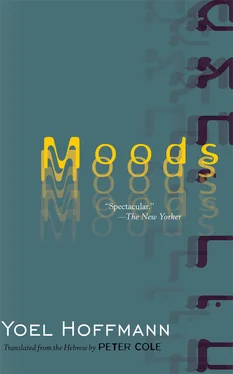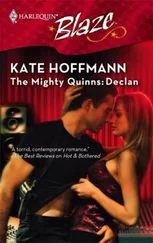We also ask for forgiveness. From the widow. From the air-conditioner technician. From the saleswoman at the Castro store.
[15]
It’s strange that the German word for widow is Witwe. Imagine that a man might say: I saw a Witwe. No one would think he had seen a widow.
I remember the smells in the widow’s home. The smell of the old suitcase over the closet. The smell of the sewing machine (which stood in the middle of the room precisely), and the smell of the pillows.
As in other books that speak of widows, so too the widow in this one hung a picture of her dead husband on the wall.
[16]
If we had to introduce her as a character we could say she was wide like the woman doctor at the end of Ya’akov Shabtai’s novel. Scenes of distant gardens, and she was kneeling.
Which brings to mind St. Ignatius of Padova, who, in the thirteenth century, sailed on a fishing boat to Alexandria, where (through miraculous acts) he saved a hundred Muslim women.
St. Ignatius, most likely, loathed the flesh, but when he blessed the women (each in turn), prayers rose up from them.
[17]
If you walked the length of the Hebrew Encyclopedia you’d get to a balcony from which you could see the sea. Sometimes we stood there all alone because the widow was speaking on the telephone, or taking a bath.
What broke our hearts was the volume of supplemental entries. We saw in our mind’s eye how the widow would look for corrections there, and also for updates to all the other volumes, and she could hardly bear the fragments of the moon above Tel Aviv. Or else she’d go into the kitchen and sit, and the teakettle would suddenly shriek.
[18]
We don’t know if this book will make it into print, but all of a sudden we’ve understood that authors breathe.
Haim Be’er is breathing, and Amos Oz is breathing, and we too are taking breaths. The heart, it’s true, can skip a beat, but one can’t skip a breath or breathe backward — only chronologically. Many things are bound so deeply, and we still haven’t spoken of air and photosynthesis, etcetera.
And it happens that a writer can die before he’s completed a word (chinaberry, for instance), or that he might pass away between books and the posthumous book won’t be written.
[19]
What exactly the widow was thinking no one ever knew. Most likely she thought we’d move into her apartment, and that in due course she’d remarry.
These things become clear in memory as well, for instance, that once she said something that had to do with it being two years since that day, and that she’d asked to have new tiles put in or had moved the Persian rug from its place. And the grocery store beneath her apartment, which had rolls by six-thirty in the morning. But mostly seeing her there on all fours, her knees on the ground and the palms of her hands on the floor.
[20]
One can write in a figurative fashion and one can write abstractly. But you’ll have to ask the academicians how to distinguish between the two.
The cattle prod (our Bible teachers told us about) is, for example, abstract, but the number eight is figurative without a doubt.
A week ago at Café Henrietta (at 186 Arlosoroff Street) I saw a man whose name was apparently Chedorlaomer. In matters like these the elements mix. In any event, it’s wise to aim at the middle ground between the two: that’s where mercy is.
[21]
The Schaffhausen watch on my father’s wrist when he died held within it tiny springs (not what they put in watches today) and nevertheless its hands displayed the correct time.
It’s possible to see how, with very fine tweezers, the Swiss watchmaker would take such a spring from the table. The Swiss man himself is made of such springs, even if they don’t work as they should within him.
The men who held these springs are already dead, or very old, and their wives have died as well. Picture the wife of a watchmaker. How she places a bowl of beets on the table.
[22]
Now we’re experiencing pain in the chest and don’t remember if the heart is on the right side or the left. The night is deep and the (digital) clock shows that it’s two-thirty.
We’re thinking of networks. Spider webs. A chain of shoe stores. Or fishermen’s nets and networks that the eyes can’t see.
And childhood loves. How we waited each morning for the girl who sat on the third bench and all the halls in the school led to her. She came through our heart as though it were the Mandelbaum Gate, but the heart (of flesh) was smaller then because we were children.
Now the butcher shops are closed, and the butchers are sleeping in their large beds. May God watch over them and their wives.
[23]
Because he has only a single life (though “life” in Hebrew is plural— hayyim ), a person always returns to the same things.
The girl in third grade — her name wasn’t what we said it was in another book. In fact we loved two girls at once. The other one was in 3-G, and her homeroom teacher was Yitzhak Karton (penultimate stress), but we’ve forgotten her name.
In the schoolyard there were faucets, and all the girls drank from them, and we could see all sorts of braids like a book that’s being translated into many languages.
[24]
Our heart breaks at the sight of fire hydrants, or words like home cooking .
How many grocers we’ve seen (at stores) and we’ve never once placed our hand on their head as the Pope might. Some of them came from Auschwitz, and now they’re dead, and we just said white bread, or two hundred grams of cheese, and left the mailboxes as they were and didn’t kneel before them or lift up our hands.
We said “we need to call the plumber,” as though the power of speech were an ordinary matter.
[25]
Later on, Bracha Kalvari asked us to undo her bra, and we went behind her like St. Francis of Brindisi, who wandered through graveyards and looked at the tombstones only from the side that was smooth.
And there was Nehamah Nehamah. The absolute parity between her first name and last seemed to determine that she would surrender her body into the hands of others as well.
But those were the days of Billie Holiday, and so every act of what we called petting trailed a saxophone’s echo.
[26]
This book barely mentions men but we owe several (from back then) a slap.
Now it’s hard to settle such accounts. We could hire a private eye to find out where they live, but then we’d be faced with men who bear almost no resemblance to who they were. And we today are different too, and undoubtedly these old men would have trouble remembering us.
And we could settle up with the teachers as well, but they’re dead, and most likely are teaching others who have died.
[27]
Joy. Breakers. A laughing dove. Tea bags. Bacchanalia. Miscarriage of justice. Thoughts. A hip’s rise. Pay stubs. Paso doble. Armageddon. Six of. Bilateralism. Oxymoron. Marble. Raspberry juice. Gustav the Great. Teeth. Serbonian Bog. Concubine. Copper mines. Vayzata. Irkutsk. Osmosis. Allies. Schopenhauer. Salmon, etcetera.
Yes. And we’ve forgotten runnels.
[28]
Rossini (the classical station’s saying just now) was plagued by backaches in 1842.
In Japanese the back is senaka. Senaka, we think, is the perfect word for it. More accurate than, for instance, back , or Rücken .
They pressed the back of the crucified one against the cross (as we once pressed Penina Tuchner against the kitchen cabinet) and the men below saw only his chest. But the back bore the brunt of the torment because it was pressed against the boards.
[29]
I had a dream: We’re (which is to say, I’m) alone at an airport. But the monitor’s showing departures only. Which is to say, planes at that airport only take off.
Читать дальше












